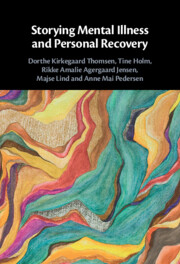Book contents
- Storying Mental Illness and Personal Recovery
- Storying Mental Illness and Personal Recovery
- Copyright page
- Contents
- Figures
- Tables
- Acknowledgments
- Chapter 1 Introducing the Book
- Chapter 2 The Science of Mental Illness
- Chapter 3 Vulnerability, Stress, and Burden in Mental Illness
- Chapter 4 Recovery and Mental Illness
- Chapter 5 Narrative Identity
- Chapter 6 Narrative Identity, Illness, and Well-Being
- Chapter 7 How Did We Collect and Analyze the Life Stories?
- Chapter 8 Overview of Narrative Identity Themes from the Initial Analyses
- Chapter 9 Relationship Themes in Narrative Identity
- Chapter 10 Self Themes in Narrative Identity
- Chapter 11 Functional-Level Themes in Narrative Identity
- Chapter 12 Treatment Themes in Narrative Identity
- Chapter 13 Summary and Synthesis
- Chapter 14 Understanding the Interplay between Narrative Identity and Mental Illness: A Framework
- Chapter 15 Tools for Narrative Repair
- Conclusion
- Book part
- References
- Index
Chapter 11 - Functional-Level Themes in Narrative Identity
Published online by Cambridge University Press: 02 February 2023
- Storying Mental Illness and Personal Recovery
- Storying Mental Illness and Personal Recovery
- Copyright page
- Contents
- Figures
- Tables
- Acknowledgments
- Chapter 1 Introducing the Book
- Chapter 2 The Science of Mental Illness
- Chapter 3 Vulnerability, Stress, and Burden in Mental Illness
- Chapter 4 Recovery and Mental Illness
- Chapter 5 Narrative Identity
- Chapter 6 Narrative Identity, Illness, and Well-Being
- Chapter 7 How Did We Collect and Analyze the Life Stories?
- Chapter 8 Overview of Narrative Identity Themes from the Initial Analyses
- Chapter 9 Relationship Themes in Narrative Identity
- Chapter 10 Self Themes in Narrative Identity
- Chapter 11 Functional-Level Themes in Narrative Identity
- Chapter 12 Treatment Themes in Narrative Identity
- Chapter 13 Summary and Synthesis
- Chapter 14 Understanding the Interplay between Narrative Identity and Mental Illness: A Framework
- Chapter 15 Tools for Narrative Repair
- Conclusion
- Book part
- References
- Index
Summary
In Chapter 11, we elaborate on the meaning of education, vocation, and cognitive function from the perspective of narrative identity. Many participants voiced problems completing education and holding jobs, emphasizing identity conclusions of personal failure. Cognitive function was mentioned less often in the life stories, possibly because it is less identity defining than education and vocation. In parallel with the bleak stories of failure, participants storied well-being into their identities in the context of education, vocation, and leisure activities. These contexts scaffolded the agentic, growing, and valued selves and relationships characterized by togetherness, acceptance, worth, and giving. Many also mentioned friendships as a boon of participating in these activities. These subthemes may give rise to identity conclusions such as “I feel valued by my colleagues,” “I can make friends,” and “I can learn from studying,” illustrating the narrative identity underpinnings of empowerment and social connection that are crucial to personal recovery. Finally, our participants narrated living space as a source of well-being, emphasizing safety and control. This chapter underscores that how narrative identity is created in the context of broader socially and culturally structured activities is central to personal recovery.
- Type
- Chapter
- Information
- Storying Mental Illness and Personal Recovery , pp. 156 - 167Publisher: Cambridge University PressPrint publication year: 2023

